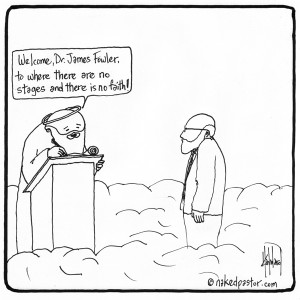Between Tradition and Altruism
A tribute to Dr. James Fowler, 1940-2015

Like David, I, too, was highly influenced by Fowler as was the late Marcus Borg who focused the attention of liberal Christians on three of Fowler’s mid-stages, renaming them “Pre-critical Naivete, Critical Thinking, and Post-Critical Naivete. Borg’s interpretation of Fowler’s Stages of Faith picked Fowler’s work up from the theological college or university, dusted it clean of its academic, empirical language, and shared it with the people in the pews. That work has been central to the progressive Christian undertaking.
Unlike Marcus Borg, however, I don’t think that Post-Critical Naivete, or as Fowler originally named it, the Conjunctive Stage, is a helpful place for people to remain. It’s much, much better than sitting in the confusion and anger that the Individuative Reflexive Stage offers with its “Why didn’t you tell me?” lament. But there has to be something between there and the grand, expansive altruism of Fowler’s Universalizing Stage. Doesn’t there?
“Dr. James Fowler” cartoon by nakedpastor David Hayward
The more I have thought about it over the years, the more I have wrestled with the limitation of Fowler’s stages. There is an edge to the Conjunctive Stage that allows us to let go of the mythic language and stories of our faith traditions and move into a place that is purely focused on values. It pulls us past a space inhabited with tradition and all the barriers and divisiveness that tradition, particularly religious tradition, can impose on the human family.
But does it drop us into the emptiness where another stage that Fowler didn’t articulate exists or does it press us into Fowler’s Universalizing category? Is it a seamless transition, no air between the two, or is there a gap? Wouldn’t it be presumptuous or arrogant for those who position themselves beyond Borg to identify as being in Stage Six? Are those who no longer carry the heavy burden of archaic language and tradition suddenly as selfless and pure as Fowler has described there?
I need to go back and re-read what I haven’t steeped myself in since I completed writing Amen: What Prayer Can Be in a World Beyond Belief. Revisiting Fowler’s work will be my little tribute to him. In Amen, I argued that using stages to affirm shifts and changes in belief were positive despite the clamor that suggests doing so is offensive to those who are not in one of the more enlightened stages. I also argued that Fowler’s Stages could and perhaps should be applied to religious institutions that, once in Stage Six where I believe they belong, they would work to thrust us forward and toward one another instead of away and apart.
I will be looking for the edges of the Conjunctive Stage that hold us within it or the markers that lie within the Universalizing Stage that permit us entrance without our having to be Mahatmas, Great Souls considered so because of the unrestrained availability of their compassion. If they aren’t there, more work needs to be done to acknowledge that there is a stage beyond divisive language and religious tradition that allows for the nurture of humanitarian values, the acknowledgement of our aloneness in a seemingly indifferent universe, the recognition of our extraordinary beauty, and a desire to create meaning and live into that work. A spiritual stage that is equally one of faith.
Perhaps identifying how far we have come will allow us to pledge ourselves to a common future path. Perhaps it will help us engage our denominations and religious institutions to see with the eyes of a universalizing faith, one in which we place our trust, our fidelity, not in the supernatural deity we left back in Stage Three, but in one another. No matter what stage that project might land itself in, it is the one to which we must put our shoulders. And I believe it is the work Dr. Fowler would have encouraged us to do.

